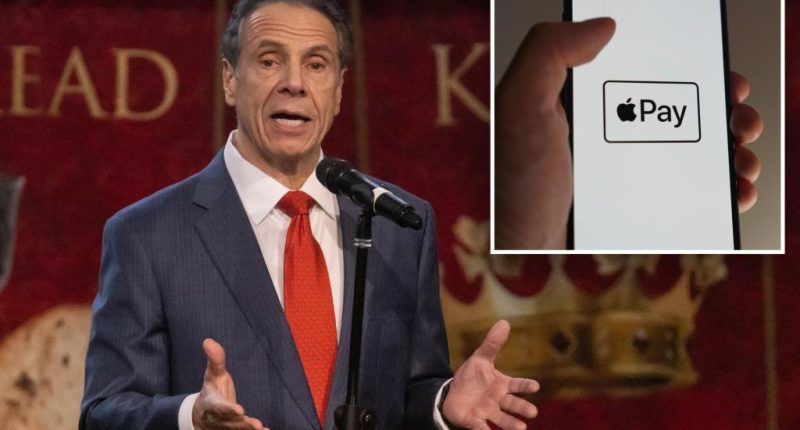Share this @internewscast.com

Former Governor Andrew Cuomo missed the chance to secure close to $3 million in public matching funds for his attempt to become New York City’s mayor. This was due to his campaign’s inability to correctly handle digital payment submissions, as revealed in new emails.
According to communications reviewed by The Post, Cuomo’s team seemingly ignored consistent advice from the City Campaign Finance Board. They recommended against using Apple Pay or Google Pay for donation requests without prior authorization and stressed the importance of closely monitoring online contributions.
On March 3, just two days after Cuomo announced his mayoral run, his campaign was explicitly informed that donations via tap phone payments were not permissible and that “Electronic Funds Transfers” required additional verification letters to confirm each donor’s details, the emails indicate.
Campaign attorneys conceded they “weren’t set up” to accept mobile and electronic payments, but said they would charge ahead with taking them anyway.
Political candidates usually register their campaigns with the CFB in hopes of becoming eligible for the city’s public funds program, in which every $1 of contributions less than $2,100 made by New Yorkers is matched with $8 in taxpayer cash.
In order to be eligible for these matching funds, candidates must go through a lengthy process ensuring donors’ addresses and payment methods are verified.
The board warned the Cuomo team multiple times over the months-long correspondence that to get mobile payments approved, the campaign would have to provide a signed affirmation letter for every such donation.
The CFB stressed that while the campaign could still collect those contributions, they would “not be considered eligible for match with public funds per Board Rules.”
The Cuomo camp attempted the major feat of collecting affirmation letters for over 50 donors, but it eventually became clear that the campaign wouldn’t be getting all of the required documentation — landing it in hot water with the CFB.
On April 11th, four days before the deadline to submit the information, the board dropped the bomb that despite team Cuomo’s efforts: “All contributions collected through the (online) platform, […] are invalid for match due to the lack of compliance with the requirement that the contributor actively agrees to an online affirmation statement.”
That prompted a last-minute scramble from the campaign, which sent out email to donors begging for the affirmation letters just two days before the April 15 deadline.
The email — which went out the morning of April 13 — came with the subject line line “Urgent – Action Required” and stressed, “THIS IS VERY IMPORTANT.”
“We need you to complete the form included in this additional email, TODAY IF AT ALL POSSIBLE. We apologize for the inconvenience, but it is critical that we get these forms back as soon as possible.”
But the warning came too late — and cost the ex-gov roughly $2.7 million in matching funds off $332,530 raised.
Cuomo’s lawyer even asked for concessions the day after the deadline on April 16th, desperately trying to remedy the situation and reverse the CFB’s decision.
But the CFB doubled down that they had warned the Cuomo team about electronic payments.
“I looked back at our correspondence about the use of Apple Pay and Google Pay for contributions collected through NGP VAN and I mentioned the following: Contributions made (1) by Apple Pay and Google Pay, (2) through NGP VAN and (3) without the address verification and ZIP code checks performed are permissible. However, these contributions will not be considered eligible for match with public funds per Board Rules,” the CFB’s campaign advisor said.
The trouble doesn’t seem to have ended there – potentially bleeding over into the CFB’s next round of matching funds – which are set to be released May 23.
As recently as April 18, Cuomo’s team signaled ongoing troubles with the pesky affirmation letters – and appeared to still be attempting to find a way to use the payment methods.
Cuomo spokesman Rich Azzopardi said a “technical software error” was to blame for the campaign losing out on the majority of the matching funds.
He also said that the snafus with Apple and Google Pay could be attributed to it being the early days of the campaign — and that staffers quickly learned the payment methods would not be accepted.

















